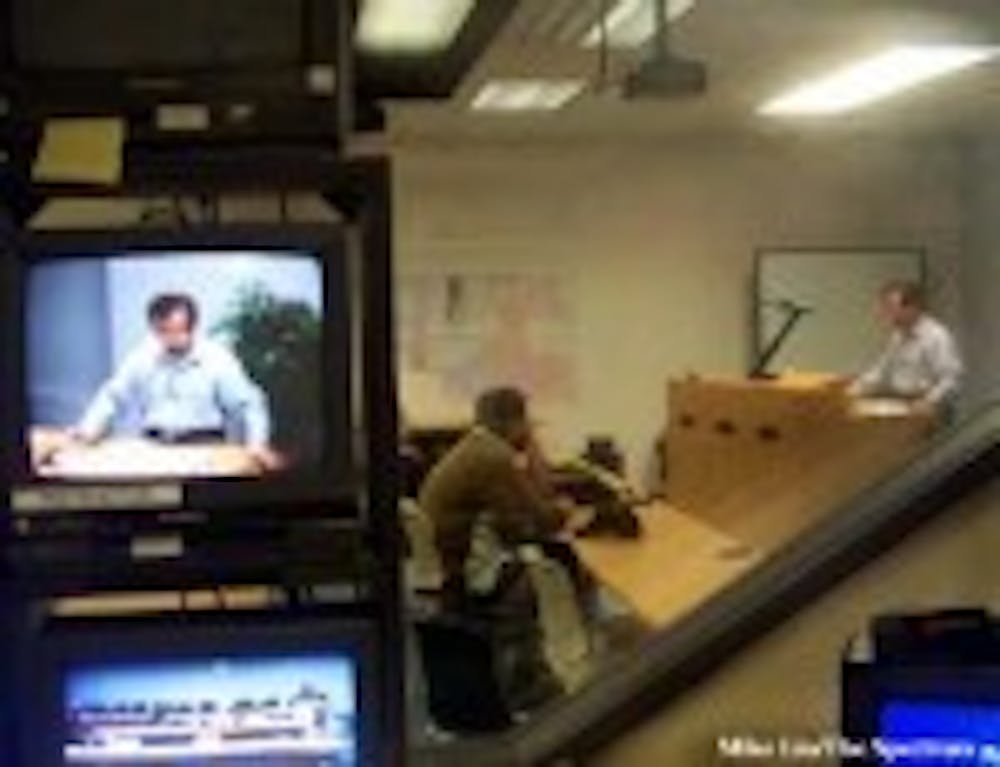For students opposed to the trek to class through Buffalo's typically cold rain and snow, the Millard Fillmore College may offer a refreshing - and comfortable - alternative to traditional learning methods.
The Distance Learning Program is a formal approach to learning where the instructor and student are separated by time and distance. Web-based courses are taught via the Internet using Ublearns, UB's course management service.
"They are fun and interactive," said Gregory Kelly, a senior history major. "They are convenient, and you don't have to worry about the weather. You just need a computer, and you can even learn in your pajamas. I wish all my classes can be online."
According to Larry Gingrich, assistant dean of the Millard Fillmore College, nearly every aspect of a normal lecture class can be made to work for an online class and that the lessons are conducted by creating "virtual classrooms" for a wide array of courses.
Gingrich said course information is converted into BlackBoard presentations and that syllabi, course descriptions and testing can all be provided online.
"There are also documents in the form of word reading and week-by-week assignments. Discussion boards are put up for interactive discussion which could be supplemented with some visual video," said Gingrich.
According to the Millard Fillmore College Web site, Web-based courses are the fastest growing approach to distance learning, with the biggest advantage being that students can take a course when it is most convenient for them.
"You can access it at any time of the day," said George Lopos, dean of the Millard Fillmore College and associate vice provost for academic affairs. "It allows non-traditional students to fit their schoolwork with their lives. They can do it after work, on weekends, or early hours of the day. They also don't need to be in driving distance of campus. It is very flexible."
Some students, however, feel these Web-based courses are detrimental to the learning process.
"If you are computer illiterate, online course definitely will not benefit the learner," said Justin Te, a junior communication major. "It would defeat the purposes of convenience, flexibility and comfort if the student is unable to access the computer without the computing skills."
In-depth knowledge of computers is not necessary to take courses online, according to Gingrich. The only requirements for students wanting to take an online course are the appropriate computer software and rudimentary knowledge of the Internet.
"There is a basic technology requirement, of having an Internet service provider or a UB dial-up with computer that is at most 4- to 5-years-old. Students should have fundamental knowledge of use of the Internet and Windows," said Gingrich.
Gingrich said the distance learning classes are gradually becoming recognized as traditional classes.
"The courses are regular UB courses. Ninety-five percent of courses are three credits, with some elective classes with one credit," said Gingrich. "There are approximately 42 Millard Fillmore College courses in spring. All but six are Web-based courses."
Gingrich said all but one of this semester's online courses were filled to capacity.
Some of the subjects offered include computing and network management, English, health and human services, nutrition, paralegal studies and public relations and advertising.
Despite the classes' growing popularity, Lopos said students who decide to become distance learners must realize that determination is necessary, since the work is distributed without frequent supervision from lecturers, professors or teaching assistants.
"The biggest problem is that Web-based courses demand a lot of responsibility on the student's part," said Lopos. "Students must be disciplined, they cannot put this off. You are in charge of your own learning."
"Sometimes people have unrealistic expectations," said Lopos. "Students expect instant replies through e-mail. People think that the instructor is available online 24 hours a day. Classrooms have immediate feedback, and there are also office hours, while Web-based courses have virtual office hours."
While Web-based courses may be more flexible for people with heavy schedules and convenient for those who do not live close to campus, they may not be for everyone.
"I would not recommend total online courses. You come to campus for more than learning," said Lopos. "There is a campus culture that young men and women should experience; a 50-year old student does not need that, they already experienced it before. For students who are aware of the challenges of taking online courses, there are benefits to be had."
Even with the growing popularity of distance learning at UB, some students did not realize UB offered such opportunities.
"I have seen commercials for that kind of stuff," said T.J Adeogba, a sophomore mechanical engineering major. "But I have never heard of it at UB."
Rhitnik Roshan, a freshman film major, said that he was unaware of the existence of online courses at UB and questioned the necessity of Web-based courses.
"Those classes are just for other colleges with a majority of part-time students," said Roshan. "I don't think there are any here at UB."





